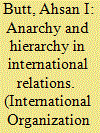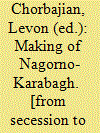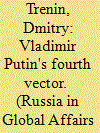| Srl | Item |
| 1 |
ID:
123018


|
|
|
|
|
| Publication |
2013.
|
| Summary/Abstract |
This article questions the validity of anarchy as an assumption in International Relations theory. Powerful states often provide public goods to smaller states in return for their acquiescence on matters of interest. This transactional provision of public goods is analogous to how central governments behave in domestic environments; thus the hierarchic structure of domestic politics is replicated in international politics. The anarchy-hierarchy distinction, which rests on a neat separation of international and domestic structures, is therefore highly contentious. One public good that great powers provide, largely ignored by the literature on hierarchy, is justice. Powerful states can provide a forum for aggrieved parties to settle their disputes, and thus contain conflicts before they escalate to war. If such a forum is no longer provided, the system reverts to anarchy, where escalation-and therefore, war-is more likely. South America's war-prone decade can be explained by the variation in structural conditions on the continent. Due to the Depression, its Good Neighbor policy, and the onset of World War II, the United States was less interested in South American affairs in the 1930s, resulting in a more anarchic structure and a higher propensity for war.
|
|
|
|
|
|
|
|
|
|
|
|
|
|
|
|
| 2 |
ID:
047770


|
|
|
|
|
| Publication |
New York, Palgrave, 2001.
|
| Description |
xv, 267p.hbk
|
| Standard Number |
0333773403
|
|
|
|
|
|
|
|
|
|
|
|
Copies: C:1/I:0,R:0,Q:0
Circulation
| Accession# | Call# | Current Location | Status | Policy | Location |
| 047137 | 947.54/CHO 047137 | Main | On Shelf | General | |
|
|
|
|
| 3 |
ID:
122364


|
|
|
|
|
| Publication |
2013.
|
| Summary/Abstract |
Tendencies will continue - a geopolitical shift towards Eurasia and the Asia Pacific Region; symbolic 'sovereignization' of Russia and its further distancing from the U.S. and Europe; and the erosion of a foreign policy consensus. The fourth edition of Putin's foreign policy will most likely differ significantly from the previous three.
|
|
|
|
|
|
|
|
|
|
|
|
|
|
|
|